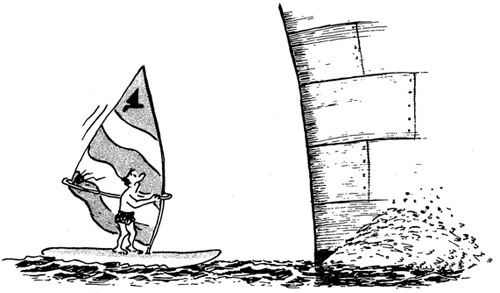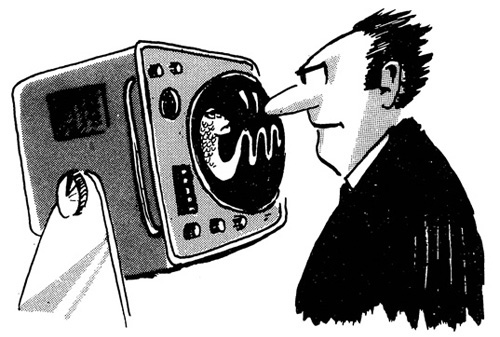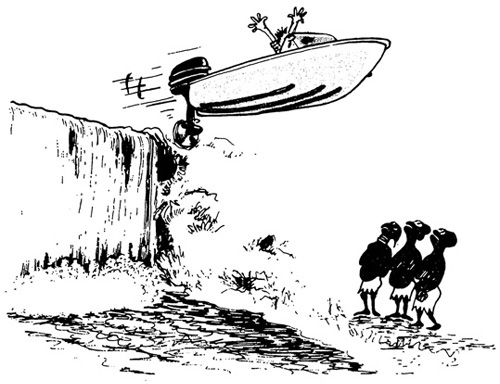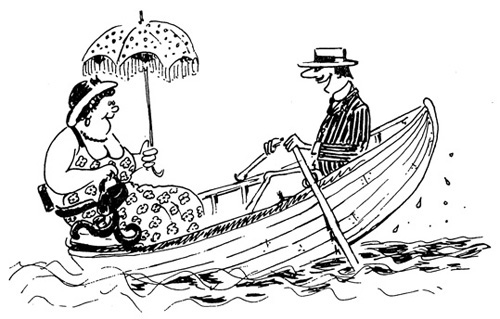Salty Dog Talk (4 page)
Authors: Bill Beavis


Cross his bows
Davy Jones Locker
According to mythology
Davy Jones Locker
is the final resting place for ships that sink, articles lost overboard and sailors who drown. Thus it became the sailor’s phrase for death. Some believe Davy Jones was a Welshman but an older school claim the name is a corruption of Duffy Jonah – duffy being the negro word for ghost and Jonah the luckless biblical figure. In contrast, sailors who die ashore go to
Fiddlers Green
– a satellite heaven filled with chorus girls and unlimited amounts of free rum and tobacco.
A broadside is that crushing remark which ends all further discussion. A broadside in the sailing navy meant the simultaneous firing of every cannon which could be brought to bear on an enemy. In a three-deck ship of the line with fifty cannon aside this meant a considerable amount of ironmongery and a very fitting analogy.
When the first cargo hoisting booms appeared in ships it was noticed that they resembled an invention by Mr Derrick, the hangman at Tynham prison. He used a single spar, topping lift and purchase to hoist condemned criminals to the gallows; up until this time only a rope had been used. Mr Derrick’s name has not achieved the same ignominious fame of M. Guillotine, but it can claim a wider market.
A not very popular dish aboard ship which consisted of passengers’ leftovers mixed with ships biscuits and reheated. A meal without much status now applied to those who once ate it.
State of depression or stagnation. Sailor’s name for a belt of calm or variable winds which lie between the trade winds of the northern and southern hemispheres. The term signified the state of apathy as crews passed through these latitudes with no breeze to fill the sails or cool their living spaces.
Apart from the obvious rural connection, the phrase was regularly used at sea and referred to heavy lifting work done by the
donkey
engine, a small steam auxiliary engine with its own boiler, fitted to sailing ships in later years.
A severe scolding or reprimand. The expression dates from the late 1660s; Jane Austin wrote: ‘I will give him such a dressing’. On ships the term dressing down means to
dress
or apply an oil preservative to the rigging. It was an unpleasant, sometimes dangerous job and might have been given in punishment.
Originates from the torpedo training schools where practice
runs
were made with torpedoes fitted with dummy warheads.
Dates from the time of Charles II when the Anglo-Dutch Wars were at their peak and the lie was circulated that Dutch crews were so cowardly that they had to be primed with schnapps before they would come out and fight. It took some believing! At that time Dutch raids in the Thames estuary were a regular event. Van Ruyter once managed to sink practically every British ship at anchor in Chatham. While in the English Channel Van Tromp inflicted such a devastating defeat on his enemy that he is said to have hoisted a broom to the masthead to show he had swept the English from the seas.

Cut of his jib
Embark
Barco
is the Spanish word for ship,
embarcar
is to go aboard the ship. Embark is derived from this word.
State of normality; when the ship’s keel is perfectly horizontal and her fore and aft draught are the same. (The expression is misapplied because in fact a fore and aft draught which reads the same is the last thing any sailor wants. A ship which floats on a perfectly even keel can be almost impossible to steer. It is customary to trim slightly by the stern.) The antipodean position
keeled over
with the vessel capsised and the keel sticking up in the air is the sailor’s term for death.
Fagged Out
From the tendency of a rope to unlay and fray at the ends. It is the result of negligence because rope ends should be kept properly whipped.
Fag end
– tail of a rope which has been allowed to become frayed.
Foul, one of the most overworked words in the nautical vocabulary. A
foul
berth describes an obstruction; a
foul
anchorage is where one ship can swing and strike another; a
foul
area is somewhere to avoid, usually a sewer outfall;
foul
ground where rocks or wrecks abound. Even the anchor found in a cap badge or flag decoration is
foul
anchor because it has a rope entwined. Almost every entanglement at sea is known as a
foul
something or another … and that goes for human relationships.

Deliver a broadside
From the Anglo Saxon
faedm
to embrace, which loosely describes the manner by which this measure arrived. A fathom is six feet which is the span of an average man’s arms. Ropes to be measured were held in each hand and stretched across the chest. Unhappily the word is dying at sea as measures and depths are now expressed in metres. However, the word still survives ashore where its figurative meaning is to get to the bottom of things to penetrate or understand.
Nominal leader with no real power but large in the public eye. The word is taken from the carved and ornamental figure which was carried at the stem of sailing ships. Primarily for decoration, figureheads also expressed the belief that a ship was a living thing and needed someone up front with eyes to see where it was going; ships from the Mediterranean and China had eyes painted on each bow. Symbolism too played a part and throughout the ages there have been an assortment of fierce and fast animals of which lions were probably the most common. About the time of the fast clipper ships it was felt that something more in keeping with their slender lines was required and the bare-breasted lady became fashionable. She has probably remained the number one choice ever since and not least because of a convenient superstition which has it that topless ladies calm the stormy seas.
The one-time name for robbers and buccaneers who seized islands off the Spanish-American coasts and used them as bases for privacy. From the Dutch
vrijbuiter
which in Spanish becomes filibustero. The word came ashore to describe the unorthodox action of one who attempts to obstruct the passage of a bill through government by endless speech making.
From the Viking
flota
meaning the sea or water. It is recorded that the Vikings had twenty-four different words for the sea and all of them derived through poetry. When the Viking was not raping, burning and pillaging, he liked nothing better than to listen to poetry about his legendary heroes, the truly great arsonists, pillagers and rapists, and their journeys across the sea. That was the problem, so often did the word
sea
crop up that the poets had to constantly find new words to avoid repetition. Hence the invention of so many Viking words which refer to the sea and which still survive today; here are some examples; far (sea
far
er); way (under
way
; making
way
); road (
road
sted); deep; flood, float; street; water and sound.
A ‘dead horse’ was the seaman’s term for the first month at sea – a month for which they would have been already paid and spent the money very quickly afterwards. So it seemed to them, with the money all gone, that the first month was spent working for nothing. To mark the end of the ‘dead horse’ month the crew would make an effigy of a horse and parade it around the decks (on passenger ships money would be collected), then with great noise and celebration the horse would be hoisted to the end of a yard, cut down and dropped in to the sea. No doubt there was the established understanding of beating a dead animal to work but to ship’s officers ‘flogging a dead horse’ described the difficulty of getting the crew to do any extra work during this first ‘unpaid’ month at sea.
A large square sail used downwind or on a reach. It could be set and handed easily and quickly, which made it especially suitable for night sailing when it was expedient to take in the light sails less they prove difficult to hand in the darkness. The phrase has come to mean a shifty person, here today and gone tomorrow.
Another case of human conduct being likened to the animations of a sail. In most sailing vessels the lower edge of the mainsail, known as the
foot
, was lashed to a boom to keep it stretched and properly shaped. However, there were some exceptions, notably the London River barges. These did not have a boom and the sail was allowed to hang loose along the foot. Loose-footed sails, as they came to be called, had a mind of their own and were more difficult to control. It is from this that the meaning footloose and fancy free is believed to have come.

Dummy run
From the middle English
fraught
which meant earnings. Gradually the term shifted to mean the objects that provided the earnings. This was then extended when the goods were carried by ship and nowadays means any material carried by air, rail or road.
A phrase often used to describe oratory where the rush of words is compared to the fast moving waters of a flood tide. Actually the waters move much more quickly on an ebb or outgoing tide but poetry is more lasting then pedantry.

